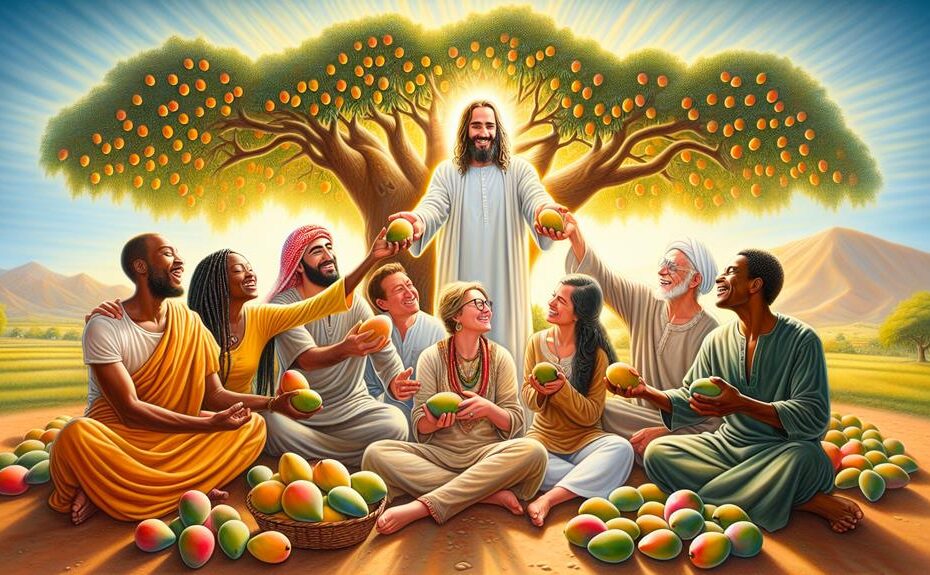Exploring the religious significance of mangoes reveals a rich tapestry of traditions where this luscious fruit symbolizes more than just a sweet treat. From Hindu rituals to Buddhist practices and Sikh ceremonies, the mango's role transcends mere culinary delight to embody deeper spiritual meanings. As you navigate through the diverse interpretations and rituals involving mangoes in various faiths, you'll discover a fascinating world where this tropical fruit serves as a conduit for divine blessings and cultural reverence.
Key Takeaways
- Mangoes symbolize prosperity, fertility, and purity in Hinduism.
- Used for offerings in Buddhist rituals, representing abundance and compassion.
- Sikhism views mangoes as auspicious, symbolizing spiritual wisdom and humility.
- Jainism sees mangoes as a symbol of purity and enlightenment, used in rituals.
- Islam considers mangoes spiritually enriching, symbolizing blessings and generosity.
Mango Symbolism in Hinduism
The mango holds significant symbolic importance in Hinduism, representing fertility, prosperity, and spiritual purity. In Hindu rituals, mangoes are often used as offerings to deities in temples. The act of presenting mangoes as offerings symbolizes the devotee's desire for prosperity and abundance in their life. Mangoes are considered auspicious fruits in Hinduism, and their sweet taste is believed to bring joy and fulfillment to those who partake in them.
Furthermore, mango rituals are commonly performed in Hindu temples during special occasions or festivals. These rituals involve the offering of ripe mangoes to the deities as a gesture of devotion and gratitude. The act of offering mangoes is believed to please the gods and goddesses, thereby ensuring their blessings and protection over the devotees. Through these rituals, Hindus seek to deepen their spiritual connection with the divine and express their reverence for the sacred fruit that symbolizes fertility, prosperity, and spiritual purity in Hinduism.
Mangoes in Buddhist Practices
Symbolizing different aspects of spirituality and tradition, mangoes play a unique role in Buddhist practices. In Buddhism, mangoes are not only seen as a symbol of abundance and prosperity but also hold deeper spiritual significance.
- Buddhist Offerings: Mangoes are often used as offerings in Buddhist rituals and ceremonies, symbolizing the sharing of blessings and the connection between the material and spiritual worlds.
- Mango Meditation: Some Buddhist traditions incorporate mangoes into meditation practices, using the fruit as a focal point for mindfulness and reflection.
- Symbol of Compassion: The sweetness and nourishment of mangoes are associated with the Buddhist value of compassion towards oneself and others.
- Sign of Impermanence: The ripening and eventual decay of mangoes serve as a reminder of the impermanence of life, a central teaching in Buddhism.
- Cultural Significance: In regions where mangoes are abundant, they have become intertwined with Buddhist culture, appearing in art, stories, and practices as a symbol of spiritual richness and growth.
Significance of Mangoes in Sikhism
Frequently intertwined with Sikh religious practices, mangoes hold a significant role in symbolizing spiritual principles and cultural traditions within Sikhism. Mango ceremonies are a common occurrence in Sikh households and Gurdwaras, where the fruit is used to signify auspiciousness and blessings. Mango offerings in Sikhism are a way to show reverence and gratitude to the divine.
Sikh mango ceremonies often involve presenting mangoes as offerings during prayers and rituals. The mango, known for its sweetness and richness, symbolizes the sweetness of spiritual wisdom and the richness of Sikh heritage. By offering mangoes, Sikhs express their devotion and seek blessings for prosperity and well-being.
The act of giving mangoes in Sikhism is not just a physical gesture but a deeply symbolic one. It represents the offering of one's best to the divine, reflecting the Sikh belief in selfless service and humility. Through mango offerings, Sikhs aim to cultivate a sense of gratitude and spiritual connection with the divine.
Role of Mangoes in Jainism
Mangoes within Jainism embody spiritual essence through their symbolic representation of purity and enlightenment. In Jain traditions, mangoes hold significance in various rituals and offerings, playing a role in spiritual practices and ceremonies.
- Jain mango rituals: Mangoes are used in specific rituals within Jainism, symbolizing the purity of the soul and the journey towards enlightenment.
- Mango offerings: Devotees offer mangoes as a gesture of reverence and gratitude to the divine, symbolizing their devotion and spiritual connection.
- Symbol of purity: Mangoes are seen as a symbol of purity and righteousness within Jain beliefs, emphasizing the importance of leading a virtuous life.
- Spiritual significance: The sweetness and richness of mangoes are often associated with spiritual enlightenment and the attainment of inner peace in Jain philosophy.
- Ceremonial practices: Mangoes are sometimes used in ceremonial practices to invoke blessings and seek spiritual guidance in Jain communities, highlighting their sacred importance in religious contexts.
Mango Traditions in Christianity
In Christian traditions, mangoes have not been historically associated with specific religious rituals or symbolisms. Unlike in some other faiths, mangoes do not hold a prominent place within Christian ceremonies or practices. The Bible, which is central to Christian belief, does not contain any direct references to mangoes or their significance within the Christian faith. Christian ceremonies such as baptisms, weddings, and communion typically do not incorporate mangoes in any symbolic or ritualistic manner. The absence of mango traditions in Christianity contrasts with the rich symbolic meanings that fruits like grapes or bread hold within Christian contexts. While Christians may enjoy mangoes as part of their diet or culinary traditions, these fruits do not carry the same religious weight as in some other cultures or religions. Overall, mangoes do not play a significant role in Christian religious practices or beliefs, remaining more of a fruit enjoyed for its taste and nutritional value.
Mango Symbolism in Islam
Within Islamic culture, mangoes hold symbolic significance in various aspects of religious and traditional practices. The mango is not only a delicious fruit but also carries deeper meanings within the Islamic faith. Here are some key points highlighting the symbolism of mangoes in Islam:
- Mango Feast: Mangoes are often enjoyed during festive occasions and celebrations in Muslim communities, symbolizing abundance and blessings bestowed by Allah.
- Spiritual Fruit: In Islamic teachings, the mango is seen as a spiritually enriching fruit, representing purity, prosperity, and the rewards of faith.
- Health and Healing: The mango is believed to possess healing properties in traditional Islamic medicine, emphasizing its role in promoting well-being and robustness.
- Generosity and Hospitality: Offering mangoes to guests is a gesture of generosity and hospitality in many Islamic cultures, reflecting the importance of sharing blessings with others.
- Divine Blessings: Some Islamic traditions view the mango as a fruit that carries divine blessings and protection, symbolizing the favor of Allah upon those who consume it.
Mango Rituals in Indigenous Religions
Symbolism and rituals surrounding the significance of mangoes extend beyond Islam into various indigenous religions, showcasing the diverse cultural and spiritual connections to this fruit. In indigenous religions, mangoes are often used in fruit offerings during spiritual ceremonies. These ceremonies are deeply rooted in the belief that mangoes symbolize fertility, abundance, and divine blessings.
During spiritual ceremonies, mangoes are meticulously selected and presented as offerings to deities or spirits as a gesture of reverence and gratitude. The act of offering mangoes is seen as a way to seek blessings, protection, and prosperity from the spiritual domain. The sweetness and richness of the mango are believed to attract positive energies and divine favor.
In some indigenous traditions, the mango tree itself holds sacred significance, believed to be a bridge between the earthly domain and the spiritual world. Mango rituals in indigenous religions serve as a way to honor nature, connect with the divine, and partake in the cycle of life and abundance.
Mango Festivities in Other Faiths
Mango festivities in various faiths globally showcase the diverse cultural celebrations and spiritual connections associated with this revered fruit. Mango celebrations are an integral part of religious practices in many faiths, symbolizing fertility, prosperity, and divine blessings. In different parts of the world, mango offerings play a significant role in religious ceremonies and rituals, signifying gratitude and reverence towards deities. Here are some examples of mango festivities in various faiths:
- Hinduism: Mango festivals like 'Mango Mela' are celebrated in India, where devotees offer ripe mangoes to deities as a gesture of devotion and seek blessings for a fruitful life.
- Buddhism: In some Buddhist cultures, mango offerings are made during Vesak celebrations, honoring the day of Buddha's birth, enlightenment, and death.
- Islam: During Ramadan, mangoes hold symbolic significance as a nutritious fruit that provides sustenance to those fasting, often included in Iftar meals.
- Christianity: In certain Christian communities, mango festivals are organized to promote community bonding and raise funds for charitable causes, showcasing the spirit of generosity and unity.
- Sikhism: Mangoes are considered auspicious in Sikhism, with devotees offering them at gurdwaras during special occasions and prayers, symbolizing humility and sharing with others.
Frequently Asked Questions
Are There Any Superstitions Around Eating Mangoes in Religious Practices?
In various cultural beliefs, consumption of mangoes is associated with superstitions and customs. Folklore often dictates specific rituals when eating mangoes in religious practices, highlighting the significance of this fruit in diverse traditions.
Do Mangoes Play a Role in Any Creation Stories or Myths?
Mangoes in creation stories and myths symbolize fertility, abundance, and divine blessings across cultures. Various superstitions around mangoes also highlight their sacred significance. Explore how these beliefs intertwine with ancient narratives and traditions.
Are There Specific Rituals Involving Mangoes During Religious Ceremonies?
During religious ceremonies, mango offerings symbolize purity and abundance. Devotees seek mango blessings for prosperity and spiritual growth. This practice is common in various traditions, reflecting the symbolic importance of mangoes in religious rituals.
Do Different Varieties of Mangoes Hold Different Religious Meanings?
Different varieties of mangoes indeed hold unique symbolic significance in various cultures. Cultural beliefs attribute different meanings to specific types of mangoes based on their taste, color, and texture, adding depth to religious rituals and traditions.
How Do Religious Communities View the Cultivation and Harvesting of Mangoes?
In various religious communities, the cultivation and harvesting of mangoes hold deep spiritual symbolism. These practices are intertwined with agricultural traditions, cultural beliefs, and religious ceremonies, emphasizing the sacred connection between nature and faith.



